Sympathy Letter For Coworker
[Your Coworker's Name],
I hope this letter finds you in a moment of calm and reflection. I wanted to reach out to let you know that I am deeply saddened by the news of the loss of your [relationship to the deceased: e.g., mother, father, spouse, etc.]. Please accept my heartfelt sympathy during this difficult time.
Words can never truly express the sorrow that comes with the departure of a loved one. Losing someone dear is undoubtedly one of life's most challenging experiences, and I can only imagine the pain and grief you must be feeling. Know that you do not have to face this alone – we are here for you, and you have the support of your colleagues and friends.
Your dedication to your work and your positive presence in the office have always been appreciated. It is evident that you are a strong and compassionate person, and I believe these qualities will help you navigate through this time of sorrow. Remember, grief is a natural process, and it is okay to take the time you need to heal and find your way through it.
If there's anything I can do to ease your burden, whether it's taking on some of your tasks or simply lending a listening ear, please don't hesitate to let me know. I understand that grieving is a personal journey, and I am ready to support you in whatever way you find helpful.
In moments like this, it's important to lean on the people who care about us. Reach out to your friends and family, share memories, and allow yourself to feel the emotions that come with loss. While it may not feel like it now, time will eventually ease the pain, leaving you with cherished memories of your loved one.
Once again, please accept my deepest condolences for your loss. Our thoughts are with you, and we are here to offer any assistance you may need as you navigate through this challenging time.
With heartfelt sympathy,
[Your Name]
Formal Sympathy Letter for Coworker
Subject: Heartfelt Condolences
Dear [Coworker Name],
I was deeply saddened to hear about [the loss / difficult situation]. Please accept my heartfelt condolences. During this challenging time, know that your colleagues are here to support you in any way we can.
Wishing you strength and comfort.
Sincerely,
[Your Name]
[Position]
Casual / Informal Sympathy Message
Subject: Thinking of You
Hi [Coworker Name],
I just wanted to let you know that I’m thinking of you during this tough time. If you need someone to talk to or help with anything at work, I’m here for you. Take all the time you need to heal and rest.
Take care,
[Your Name]
Heartfelt Sympathy Letter
Subject: Deepest Sympathy
Dear [Coworker Name],
I am truly sorry to hear about [the event or loss]. Your courage and resilience have always inspired us, and during this time, we hope you feel supported and cared for by your work family. Please accept our sincere condolences and know that we are thinking of you.
Warm regards,
[Your Name]
[Position]
Team-Oriented Sympathy Letter
Subject: Our Thoughts Are With You
Dear [Coworker Name],
On behalf of the entire team, we want to express our heartfelt sympathy regarding [the loss or situation]. We hope you feel our support and care during this difficult time. We are here for you, both personally and professionally.
With sympathy,
[Team Name]
Quick Sympathy Note / Short Message
Subject: Thinking of You
Dear [Coworker Name],
I’m so sorry to hear about [the event]. Sending you my thoughts and wishing you strength during this time.
Sincerely,
[Your Name]
Creative / Encouraging Sympathy Letter
Subject: Holding You in Our Thoughts
Dear [Coworker Name],
We understand how difficult this time must be for you, and we want you to know that you are not alone. Your colleagues admire your strength and hope this message brings a little comfort. Take the time you need, and remember we are here to support you every step of the way.
With warmest regards,
[Your Name]
[Position]
What / Why: Purpose of a Sympathy Letter for Coworker
A Sympathy Letter for a coworker is a formal or informal written communication that expresses compassion and support during difficult times, such as illness, loss, or personal hardship. The purposes include:
- Conveying care and concern.
- Offering emotional support and encouragement.
- Maintaining workplace camaraderie and empathy.
- Providing a personal connection during tough times.
Who Should Send a Sympathy Letter for a Coworker
- Direct supervisors or managers.
- Colleagues who have a close working relationship.
- Teams collectively for group expressions of support.
- HR representatives for formal acknowledgment of personal hardship.
Whom a Sympathy Letter Should Be Addressed To
- The coworker experiencing the loss or hardship.
- In case of group letters, all contributors’ names may be included.
- Ensure privacy and sensitivity; avoid unnecessary distribution.
When to Send a Sympathy Letter for a Coworker
- Immediately after hearing about a significant event or loss.
- During hospitalization or recovery from illness.
- Following bereavement or family-related tragedies.
- Anytime ongoing support or encouragement is appropriate.
How to Write and Send a Sympathy Letter
- Begin with a warm, empathetic greeting.
- Clearly express sympathy and acknowledge the event or loss.
- Offer support or assistance if appropriate.
- Use a tone consistent with your relationship (formal, casual, or heartfelt).
- Deliver in the proper mode: printed letter for formal, email or message for immediate support.
- Keep the letter concise and respectful.
Formatting Guidelines for Sympathy Letters
- Length: 1–3 paragraphs.
- Tone: Compassionate, empathetic, and respectful.
- Wording: Simple, sincere, and thoughtful; avoid clichés or trivialization.
- Mode: Email for immediate support; printed letter for formal acknowledgment.
- Closing: Offer support, encouragement, or presence; sign with warmth.
Requirements and Prerequisites Before Sending
- Verify details about the event or loss to avoid errors.
- Understand the recipient’s personality and preference for communication style.
- Ensure your tone is appropriate for professional boundaries.
- Prepare any offers of assistance or support to include in the letter.
After Sending / Follow-up Actions
- Respect the coworker’s privacy and emotional needs.
- Offer tangible support if feasible, such as helping with workload.
- Be available for conversation or assistance without being intrusive.
- Monitor the situation and send follow-up notes or messages of encouragement if appropriate.
Tricks and Tips for Writing Sympathy Letters to Coworkers
- Personalize the message with the coworker’s name and situation.
- Avoid over-elaborate language; simplicity conveys sincerity.
- Balance professionalism with warmth to maintain workplace appropriateness.
- Express willingness to help or support in practical ways.
- Send the letter promptly to demonstrate timely empathy.
Common Mistakes to Avoid in Sympathy Letters
- Being too casual or flippant about the situation.
- Including personal opinions or judgment about the event.
- Sending late messages that may appear insincere.
- Using overly formal or impersonal language that feels cold.
- Sharing details or gossip that may breach privacy.
Elements and Structure of a Sympathy Letter for Coworker
- Subject Line/Title: Clear and empathetic.
- Greeting: Use the coworker’s name appropriately.
- Acknowledgment: Reference the event or loss respectfully.
- Expression of Sympathy: Show genuine care and concern.
- Support or Offer: Mention willingness to assist or provide comfort.
- Closing: Warm and considerate sign-off.
- Signature: Name, position (if formal), or team name.
- Optional Attachments: Cards, flowers, or other tokens of support.
Compare and Contrast: Sympathy Letters vs Other Support Methods
- Letters provide lasting and personal acknowledgment versus verbal condolences that may be forgotten.
- Emails or messages are faster but may feel less formal or impactful.
- Alternative methods: in-person condolences, group cards, phone calls, or gestures of support.
- Written letters are appropriate for formal situations, while casual messages suit closer colleagues.
Pros and Cons of Sending Sympathy Letters to Coworkers
Pros:
- Strengthens workplace relationships and shows empathy.
- Provides emotional support and comfort.
- Maintains professionalism while offering personal care.
Cons:
- Poorly worded letters can cause discomfort.
- Timing must be considered carefully to avoid appearing insensitive.
- Overly formal or impersonal letters may fail to convey genuine care.

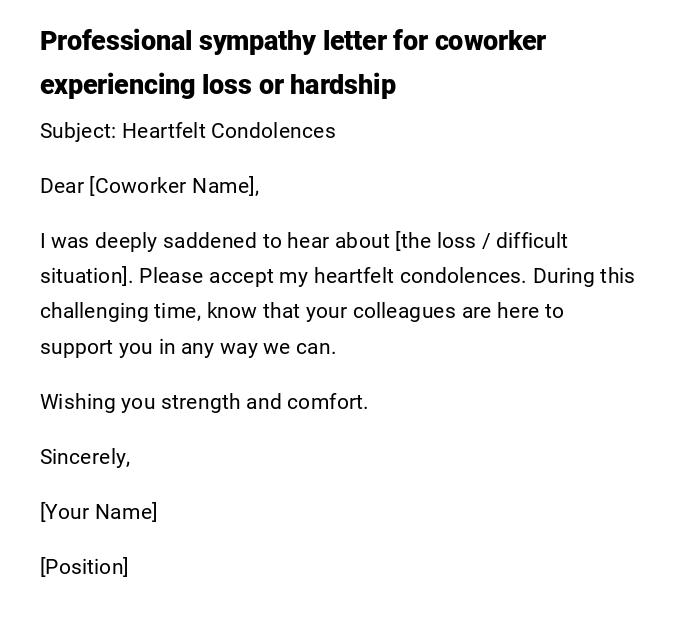
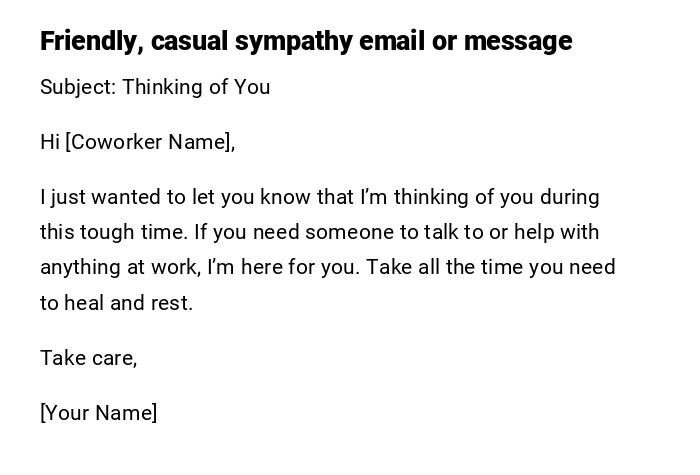
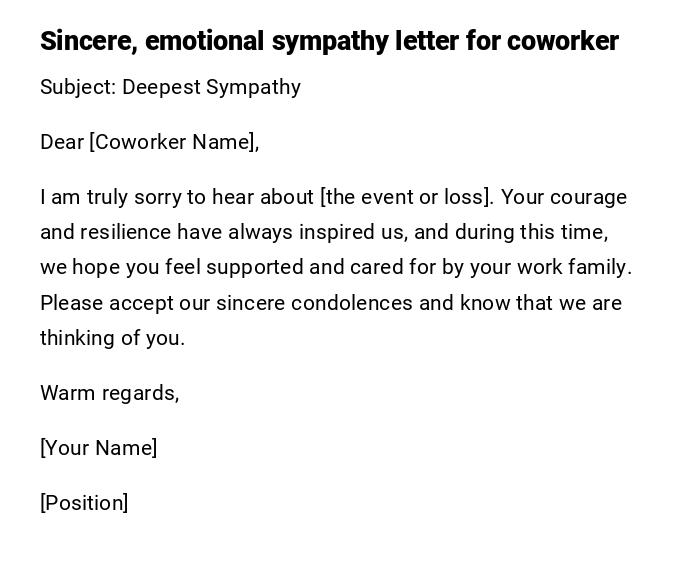
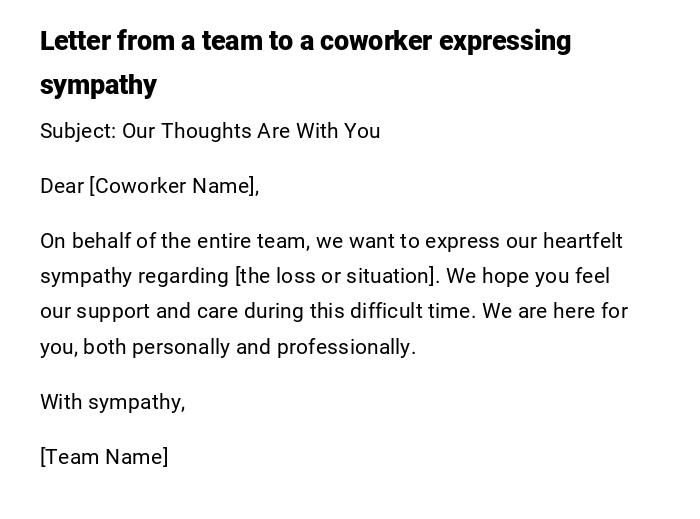
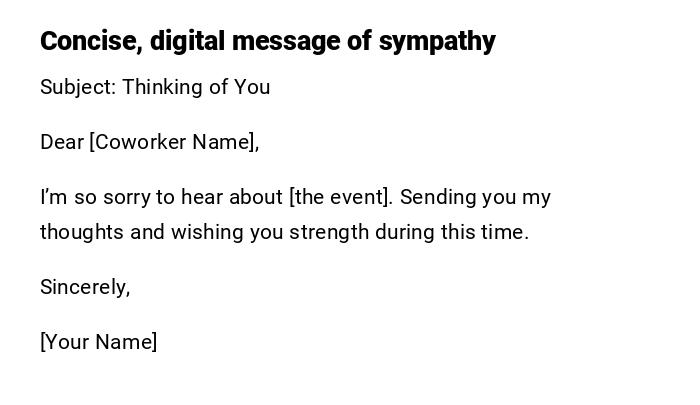
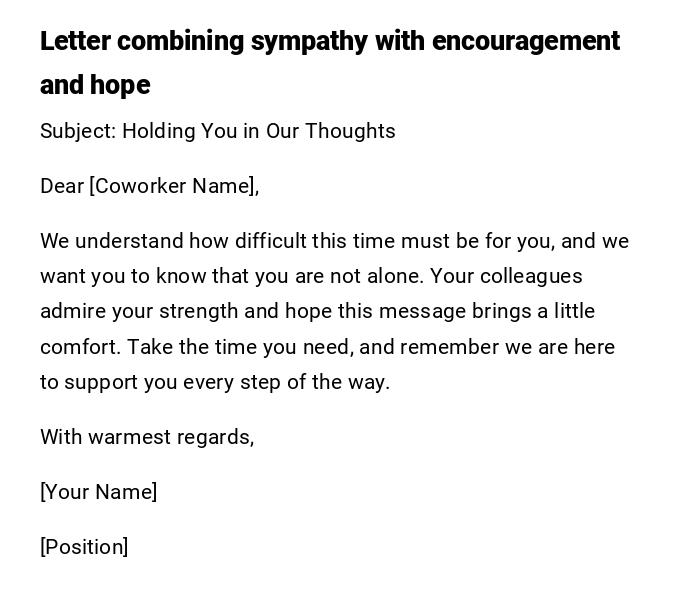

 Download Word Doc
Download Word Doc
 Download PDF
Download PDF